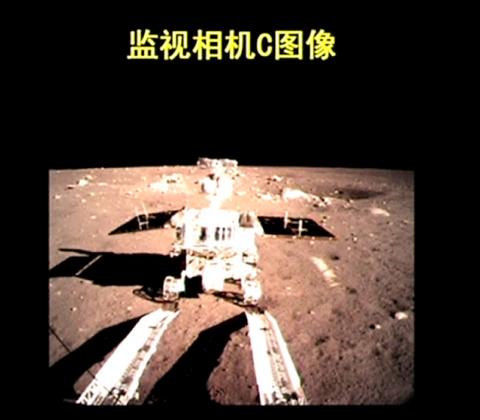China’s first moon rover has touched the lunar surface and left deep traces on its loose soil, state media reported yesterday, several hours after the country successfully carried out the world’s first soft landing of a space probe on the moon in nearly four decades.
The 140kg “Jade Rabbit” rover separated from the much larger landing vehicle early yesterday, about seven hours after the unmanned Chang’e 3 space probe touched down on a fairly flat, Earth-facing part of the moon.
State broadcaster China Central Television (CCTV) showed images taken from the lander’s camera of the rover and its shadow moving down a sloping ladder and touching the surface, setting off applause in the Beijing control center. It said the lander and rover, both bearing Chinese flags, would take photographs of each other.

Photo: Reuters
The six-wheeled rover will survey the moon’s geological structure and surface and look for natural resources for three months, while the lander will carry out scientific explorations at the landing site for one year.
The mission marks the next stage in an ambitious space program that aims to eventually put a Chinese astronaut on the moon. China’s space program is an enormous source of pride for the country, the third to carry out a lunar soft landing — which does not damage the craft and the equipment it carries — after the US and the former Soviet Union. The last one was carried out by the Soviet Union in 1976.
“It’s still a significant technological challenge to land on another world,” Jane’s Space Systems and Industry consultant editor Peter Bond said. “Especially somewhere like the moon, which doesn’t have an atmosphere, so you can’t use parachutes or anything like that. You have to use rocket motors for the descent and you have to make sure you go down at the right angle and the right rate of descent and you don’t end up in a crater on top of a large rock.”
On Saturday evening, CCTV showed a computer-generated image of the Chang’e 3 lander’s path as it approached the surface of the moon, saying that during the landing period it needed to have no contact with Earth. As it was just hundreds of meters away, the lander’s camera broadcast images of the moon’s surface.
The Chang’e 3’s solar panels, which are used to absorb sunlight to generate power, opened soon after the landing.
The mission blasted off from southwest China on Dec. 2 on a Long March-3B carrier rocket. It is named after a mythical Chinese goddess of the moon and the Yutu rover, or “Jade Rabbit” in English, is the goddess’ pet.

MORE VISITORS: The Tourism Administration said that it is seeing positive prospects in its efforts to expand the tourism market in North America and Europe Taiwan has been ranked as the cheapest place in the world to travel to this year, based on a list recommended by NerdWallet. The San Francisco-based personal finance company said that Taiwan topped the list of 16 nations it chose for budget travelers because US tourists do not need visas and travelers can easily have a good meal for less than US$10. A bus ride in Taipei costs just under US$0.50, while subway rides start at US$0.60, the firm said, adding that public transportation in Taiwan is easy to navigate. The firm also called Taiwan a “food lover’s paradise,” citing inexpensive breakfast stalls

TRADE: A mandatory declaration of origin for manufactured goods bound for the US is to take effect on May 7 to block China from exploiting Taiwan’s trade channels All products manufactured in Taiwan and exported to the US must include a signed declaration of origin starting on May 7, the Bureau of Foreign Trade announced yesterday. US President Donald Trump on April 2 imposed a 32 percent tariff on imports from Taiwan, but one week later announced a 90-day pause on its implementation. However, a universal 10 percent tariff was immediately applied to most imports from around the world. On April 12, the Trump administration further exempted computers, smartphones and semiconductors from the new tariffs. In response, President William Lai’s (賴清德) administration has introduced a series of countermeasures to support affected

CROSS-STRAIT: The vast majority of Taiwanese support maintaining the ‘status quo,’ while concern is rising about Beijing’s influence operations More than eight out of 10 Taiwanese reject Beijing’s “one country, two systems” framework for cross-strait relations, according to a survey released by the Mainland Affairs Council (MAC) on Thursday. The MAC’s latest quarterly survey found that 84.4 percent of respondents opposed Beijing’s “one country, two systems” formula for handling cross-strait relations — a figure consistent with past polling. Over the past three years, opposition to the framework has remained high, ranging from a low of 83.6 percent in April 2023 to a peak of 89.6 percent in April last year. In the most recent poll, 82.5 percent also rejected China’s

PLUGGING HOLES: The amendments would bring the legislation in line with systems found in other countries such as Japan and the US, Legislator Chen Kuan-ting said Democratic Progressive Party (DPP) Legislator Chen Kuan-ting (陳冠廷) has proposed amending national security legislation amid a spate of espionage cases. Potential gaps in security vetting procedures for personnel with access to sensitive information prompted him to propose the amendments, which would introduce changes to Article 14 of the Classified National Security Information Protection Act (國家機密保護法), Chen said yesterday. The proposal, which aims to enhance interagency vetting procedures and reduce the risk of classified information leaks, would establish a comprehensive security clearance system in Taiwan, he said. The amendment would require character and loyalty checks for civil servants and intelligence personnel prior to